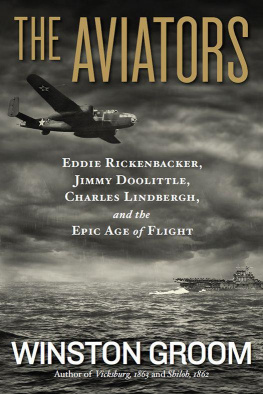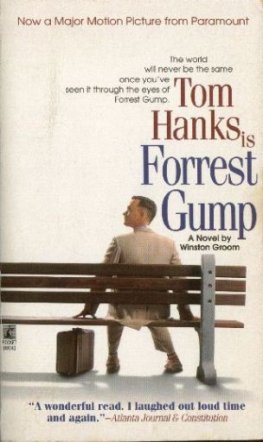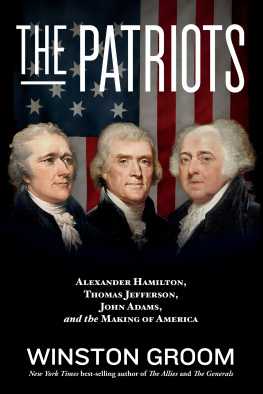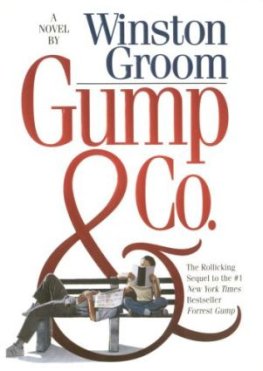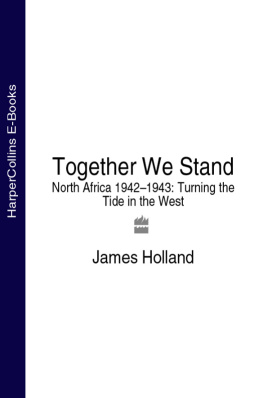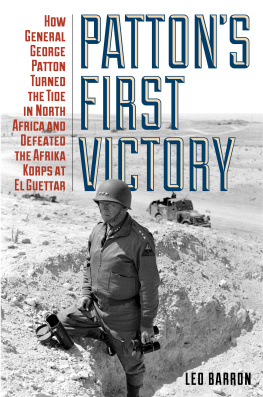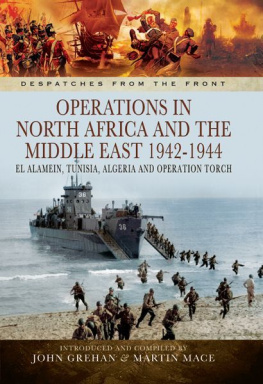

Also by Winston Groom
Better Times Than These
As Summers Die
Only
Conversations with the Enemy (with Duncan Spencer)
Forrest Gump
Shrouds of Glory
Gone the Sun
Gumpisms
Gump & Co.
Such a Pretty, Pretty Girl
The Crimson Tide
A Storm in Flanders
1942
The Year that Tried Mens Souls
Winston Groom

Copyright 2005 by Winston Groom
All rights reserved. No part of this book may be reproduced in any form or by any electronic or mechanical means, or the facilitation thereof, including information storage and retrieval systems, without permission in writing from the publisher, except by a reviewer, who may quote brief passages in a review. Any members of educational institutions wishing to photocopy part or all of the work for classroom use, or publishers who would like to obtain permission to include the work in an anthology, should send their inquiries to Grove/Atlantic, Inc., 841 Broadway, New York, NY 10003.
Every effort was made to secure permissions for photographs and text. Please contact the publisher if you have information regarding permissions.
The Death of the Ball Turret Gunner and excerpt from Losses from The Complete Poems by Randall Jarrell. Copyright 1969, renewed 1997 by Mary von S. Jarrell. Reprinted by permission of Farrar, Straus and Giroux, LLC.
Excerpts from Death March: The Survivors ofBataan, copyright 1981 by Donald Knox, reprinted by permission of Harcourt, Inc.
All interior photographs courtesy of the National Archives except for photo of Cat Island, Mississippi, courtesy of Inga Coates-Boyea on behalf of Robert Coates.
Published simultaneously in Canada
Printed in the United States of America
Library of Congress Cataloging-in-Publication Data
Groom, Winston, 1944
1942 : the year that tried mens souls / Winston Groom.
p. cm.
eBook ISBN-13: 978-1-5558-4778-4
1. World War, 1939-1945. I. Title.
D755.4.G76 2005
940.53dc22 2004062779
Grove Press
an imprint of Grove/Atlantic, Inc.
841 Broadway
New York, NY 10003
Distributed by Publishers Group West
www.groveatlantic.com
In memory of my parents, both of whom did their part when their nation called
The Axis knew that they must win the war in 1942 or lose everything.
Franklin Delano Roosevelt, State of the Union speech, January 6, 1943
Now, this is not the end, it is not even the beginning of the end. But it is, perhaps, the end of the beginning.
Winston Churchill, November 10, 1942
Foreword
To the generation of Americans who lived through it, the Second World War was the defining event of the twentieth century, much as the Civil War had been eighty years earlier. Those born in the first part of the century who came of age in the 1930s and 40s routinely began to describe almost every event and memory of their lives as having occurred before the war, during the war, or after the war.
It was the most dangerous and deadly conflict ever inflicted on the planet. At stake was the fate of the world. If the war had been lost to the Axis powers, modern civilization would have fallen under the sway of cruel tyrants and the world perhaps subjected to another forty generations of darkness, as it was after the barbarians conquered the Roman empire. No nation was safe from the evil, whether it chose to be neutral or not; it was spreading like a cancer across the world.
Twenty years earlier a savage four-year-long war had been fought in Europe, Africa, and the Middle East between the Western democracies, Russia, and the GermanAustria-Hungarian empires over control of those same areas. The Germans lost and were subjected to a harsh peace. This was the Great War, and, in the hopeful eyes of many, the War to End all Wars. Later it became known as the world war but, finally, just the First World War, to distinguish it from what came later.
The truce of 1918, followed by the peace of 1919, did not last long. Whereas the rulers of Germany in 1914 and her allies who provoked World War I wereto use the term in its most generous senseat least gentlemen, the leaders of the Axis powers in 1941 were thugs. They were, most of them, amoral murderers and brutish torturers who gained power through assassination and corruption, and more than sixty years after the fact this remains a stubborn truth.
That is not to say that America, Great Britain, and the other Allied nations were always on the side of the angels. Joseph Stalin in his totalitarian Soviet Union was certainly a great monster, as the Russian people finally now can, and will, freely admit. But war often makes strange bedfellows, and the Western democracies alliance with the Soviet communists, however expedient or necessary, was among the strangest.
If the Second World War defined the twentieth century, then the year 1942 can be understood as having defined the war itself. It was the most perilous of times; for the United States and its allies, the first six months of that year saw a relentless flood of military disasters with the Axis almost everywhere victoriousespecially in the Pacific, where Imperial Japan conquered territory after territory, despite the most strenuous efforts to stop them. In the minds of many Americans the final outcome of the war was in doubt.
Into this roiling, fearful, fateful year I was conceived, as were many others of the so-called war-babies generation. I was not born into a family of warriors, although practically every generation of it has served in one American war or another, from the War of Independence and the War of 1812, to the Creek Indian wars and the Civil War, to the Spanish-American War and the First World War.
Now came my fathers turn. Like many young men of his day he was a member of the National Guard, an institution that each of the states maintains under federal guidance and law to keep the peace and, more important, provide the structure for a responsive army in case of a national emergency. This emergency soon came as war clouds gathered over Europe and the Pacific, and practically all national guardsmen found themselves on the front lines during the first year of the war.
The National Guard was both a social and a military organization in most southern states, and in my home state of Alabama this was certainly the case. Fine dinners and balls were held in the Fort Whiting National Guard Armory, an imposing three-story white stone structure alongside Mobile Bay. In faded photograph albums there are pictures of my father, escorting my mother, soon to be his fiancee, in his dress uniform, complete with sword and formal military regalia. But of course there was also the serious side, and as war broke out with the Japanese attack on Pearl Harbor, my father was ordered to Fort Riley, Kansas, with, of all things, a regiment of horse cavalry.
These horse soldiers were already an anachronism, but in the military services traditions die hard, and so my father, then thirty-six years old, found himself at the reins of a large animal on the plains of Kansas, practicing tactics and maneuvers long rendered archaic by the evolution of modern warfare. Not long afterward his bemusement was relieved when somebody at headquarters discovered that he was, by trade, an attorney, and as the U.S. War Department had almost completed an enormous structure in Arlington, Virginia, known as the Pentagon he was requested to report there and assume lawyerly duties as a captain in the U.S. Army Judge Advocate Generals Corps.
Next page

